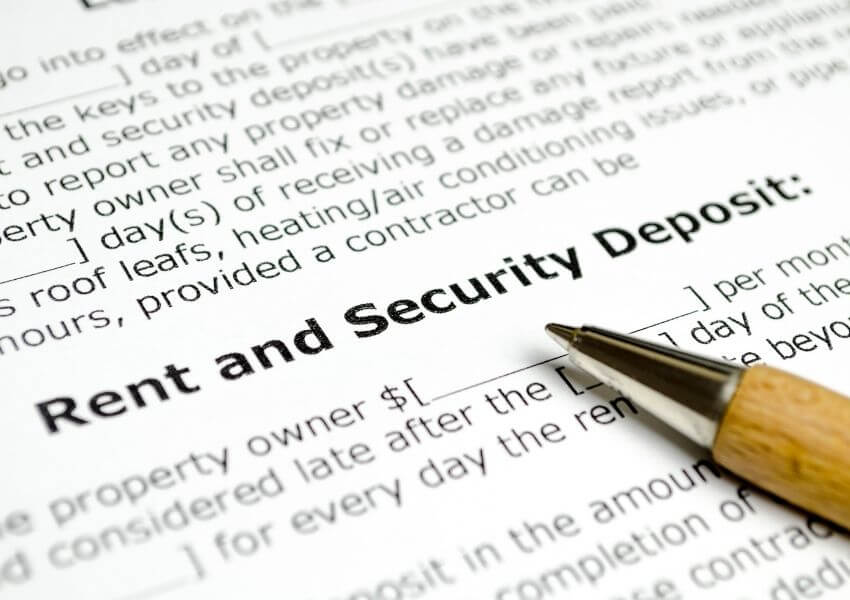
Many landlords in Georgia typically ask for a security deposit in their lease agreement. This security deposit, which can include damage deposits, advance rent deposits, or pet deposits, serves to shield the landlord from the financial damage that can arise from certain negligent tenant actions.
Examples of such actions include:
- Unpaid rent
- Excessive damage caused by a tenant's breach of lease agreement
- Abandoning the unit
- Unpaid fees for pets
- Leaving rental units unclean at move-out
- Unpaid repair or utility charges, or services for cleaning contracted by the tenant
That being said, there are landlord-tenant laws every landlord must abide by when charging security deposits. Failure to follow them can mean forfeiting the right to any part of the security deposit, as well as being liable to pay damages.
The following are Georgia's security deposit laws.
Maximum Security Deposit
There is no limit to how much landlords can charge as a security deposit in the state of Georgia according to Georgia law.
It may, however, be in the landlord's best interests to put a reasonable security deposit amount in your lease agreement. This will keep their rental unit desirable to prospective tenants and therefore lower your vacancy rates.
Charging the equivalent of one or two month's rent as a security deposit in the rental agreement should suffice for most rental units under the Georgia security deposit laws.
Additional Security Deposits
Georgia also allows landlords to charge an additional pet deposit. Like any other security deposit, a pet deposit helps ensure that the tenant won’t allow their pet to damage the rental property.
The security deposit may or may not be refundable at the end of the lease term.
However, people with disabilities who use service animals are an exception to the type of security deposits known as pet deposits. That’s because disability is a protected characteristic under the Fair Housing Act.
This act requires landlords to provide an equal opportunity to tenants who use service animals or emotional support animals. A landlord can't charge them a pet deposit as a service animal is not a pet.
Security Deposit Storage Rules
Georgia requires each landlord to store their tenants’ security deposits in a certain manner. Specifically, you have two options in this regard.
The first option is to store your tenant’s security deposit in an escrow account. The escrow account must be in a bank or lending institution that’s regulated by either state or federal law.
The second option the landlord has is to post a surety bond. A landlord can post a surety bond for the entire amount of the Georgia security deposit. As a landlord, you’ll serve as the bond’s principal.
If the landlord fails to store their tenant’s security deposit in the right manner, there may be certain consequences, including forfeiting their right to withhold any portion of the security deposit.
Security Deposit Receipt
Tenants in Georgia have a right to receive written notice on two occasions. First, the landlord must notify their tenant in a written statement about the location of their security deposit, i.e. how it's being stored.
On the second occasion, the landlord must provide the tenant with a list of all existing damages and defects in the unit that exceed normal wear and tear before they move in. Your tenant will then have a right to inspect the unit to validate the claims.

If they agree, both landlord and tenant must sign the document. This will serve as proof under security deposit law of the property’s condition when the tenant first moves into the unit.
If the tenant doesn’t agree with those claims, they must indicate which specific items they disagree with. Then, they must sign a written statement of dissent.
If the landlord fail to provide their tenant with a written notice, yothry u may forfeit their right to keep any portion of their deposit.
Reasons for Keeping a Tenant’s Security Deposit
As already mentioned, Georgia landlords have a right to keep all or a portion of their tenant’s security deposit.
However, the reason for doing so must be legitimate. The following are such reasons:
- Nonpayment of rent or unpaid rent
- Actual damages to the property exceeding ordinary wear and tear
- Unpaid pet fees
- Unpaid cleaning bills by the tenant with third parties
- Nonpayment of utility bills
- Fees for late payment of rent
- Any additional costs associated with the tenant abandoning the property
To clarify, landlords in Georgia are not required to make deductions to a tenant’s deposit to cover property damage under Georgia's security deposit law. For a landlord to do so, two conditions must be met. If they aren't, they'll be required to return the security deposit.
For one, the actual damages must exceed normal wear and tear. Secondly, the damage must not have been included in the list of existing damages prior to the tenant moving in.
Walk-Through Inspection
In Georgia, landlords have exactly 3 days after their tenant moves out to inspect the unit for damage. If there are any damages exceeding normal wear and tear, they must make an itemized list.
In the list, a Georgia landlord must also make it clear that the tenant must agree to the damages or dissent to the claims. If a tenant agrees, the landlord can continue.
As a landlord, your tenant will also have a right to inspect the rental property with the list you gave them. They must do this within five days of moving out. If they agree to the list, they must prove so with their signature. And if they refuse, then they must write out the items they disagree with and sign a dissenting statement.
Security Deposit Returns
Georgia law requires landlords to return security deposits one month after the tenant moves out. The landlord is allowed to deduct from the deposit for estimated costs of repairs. If the Georgia landlord won’t be returning the full security deposit, they’re required to provide their tenant with an itemized list of damages.
A landlord must send the itemized list of property damages, as well as the remaining portion of the deposit to the tenant’s last known forwarding address via first-class mail. If the landlord isn’t able to locate the tenant within ninety days of sending the notice via first-class mail, and the landlord has made a reasonable effort to do so, the deposit will become theirs.
Illegally withholding a tenant’s deposit may have some repercussions. Among other things, like your tenant potentially taking them to small claims court, the landlord may have to pay the tenant up to 3 times the amount wrongfully withheld.
Sale of Rental Unit
If you sell your property or it otherwise changes hands, you must transfer all deposits to the incoming owner.
Alternatively, you must return the deposit (minus any allowable deductions) back to your tenants.
Disclaimer: This property management blog isn’t a substitute for expert legal advice and services from a qualified attorney. Laws may change and this post may not be updated at the time you read it.
If you need help with any aspect of property management, please do get in touch with us.
Vineyard Property Management is an award-winning property management company in Marietta, Georgia with over 40 years of professional experience. We can help you by handling the day-to-day operations of your rental property. Get in touch today!


